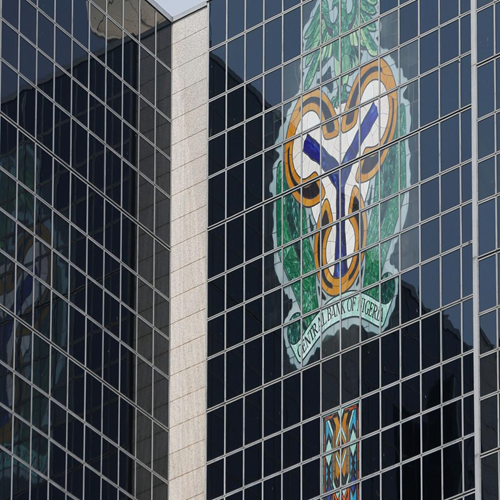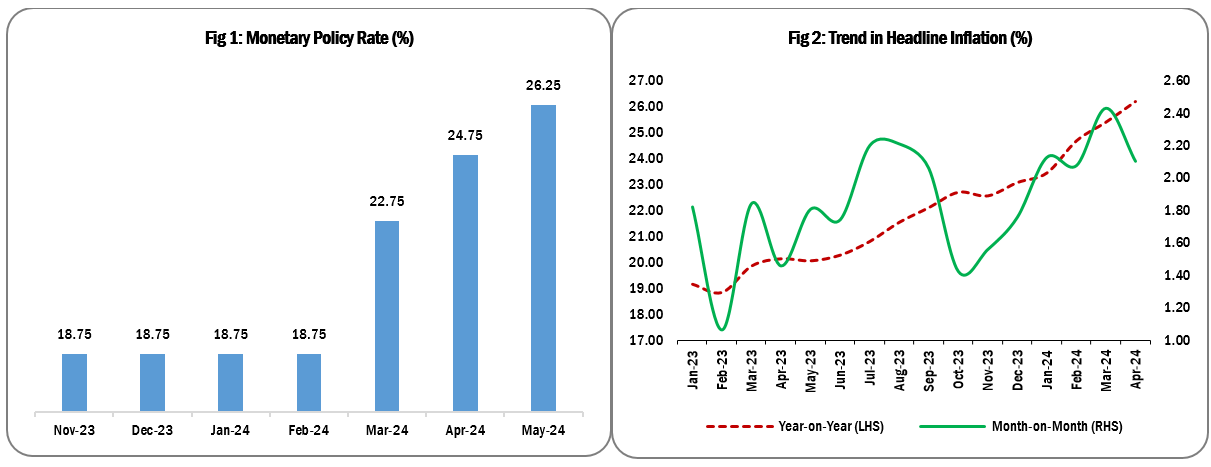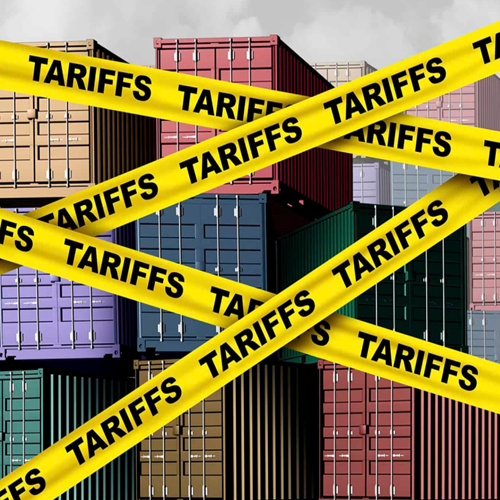Posted Fri, May 24, 2024 1:43 PM
The Recent Hike in the Monetary Policy Rate

The Central Bank of Nigeria (CBN) Monetary Policy Committee (MPC) convened for its third meeting of 2024 on May 20/21. The committee members voted to increase the Monetary Policy Rate (MPR) by 150 basis points to 26.25 percent. This marks the third instance in 2024 whereby the MPC has adopted a hawkish stance. Over the course of these three consecutive meetings, the MPC has raised the MPR by a total of 750 basis points from 18.75 percent in January 2024 (see Fig 1).

Data: NBS; Chart: NESG Research
However, the committee unanimously agreed to leave other monetary policy parameters unchanged. The Cash Reserve Ratio (CRR) for deposit money banks remains at 45 percent, the Liquidity Ratio at 30 percent, and the asymmetric corridor at +100/-300 basis points around the MPR.
The primary rationale behind the restrictive monetary policy is to rein in the rising headline inflation rate. However, the inflation rate stood at a record high of 33.7 percent in April 2024, up from 29.9 percent in January 2024 before the first hawkish stance in February 2024. According to MPC members, inflationary pressures are driven by traditional factors such as high transport costs, infrastructure-related constraints, insecurity in food-producing regions, and exchange rate depreciation.
Meanwhile, the tight monetary policy is beginning to yield positive outcomes. The month-on-month headline inflation rate moderated to 2.2 percent in April 2024, down from 3.1 percent in February 2024 (see Fig 2). Similarly, the month-on-month food and core inflation rates declined in April 2024.
Critical Considerations
1. Impact on Borrowing Costs: While the outcome of the MPC meeting is commendable, persistent hikes in the MPR will increase borrowing costs, potentially stifling domestic investments and economic growth. Moderating the pace and magnitude of interest rate hikes is essential to allow time to assess the impact of recent and past increases.
2. Structural versus Monetary Inflation Drivers: The limited response of headline inflation to three consecutive MPR hikes indicates that Nigeria’s inflationary pressures are more structural than monetary. Consequently, monetary measures alone may be insufficient to tame inflation, and the CBN must be cautious about overly constricting the economy. An unguided contractionary policy could exacerbate structural factors driving cost-push inflation, negatively impacting businesses and productivity.
3. Collaborative Inflation Control: The CBN's focus on price stability is commendable, but controlling inflation requires collaborative efforts between fiscal and monetary authorities. The fiscal authority's passive response may partly explain the limited progress in curbing inflation.
4. Exchange Rate Stability: Exchange rate depreciation contributes to rising inflation, highlighting the need to increase non-oil foreign exchange (FX) earnings. The unification of official exchange rates should be complemented by efforts to boost FX inflows from commodity sales, foreign investments, and remittances to reduce the pressure on the Naira and external reserves.
5. Food Price Drivers: Elevated food prices, a major driver of headline inflation, are largely due to insecurity and farmer displacement. Addressing the root causes of social, economic, and political exclusion to combat terrorism in Nigeria's food-producing regions is urgently needed to enhance agricultural productivity.
6. Infrastructure and Business Costs: The cost of doing business and market access has risen due to infrastructural deficits and recurrent premium motor spirit (PMS) scarcity. Strengthening the Public-Private Partnership (PPP) framework to attract foreign investment and exploring alternative infrastructure financing is imperative to reduce the fiscal burden on the government and expedite infrastructural development.
Find a blog post
Latest Releases

NESG Hosts Fireside Chat with Pr .. Read
1 day ago

Strategic Implications of US Rec .. Read
1 week ago

Development as Attitude: A Natio .. Read
3 days from now
